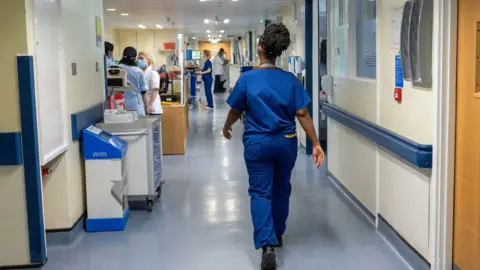Cancer: Wales among worst countries for survival, data suggests
 PA Media
PA MediaWales is one of the worst countries for people surviving three of the six deadliest forms of cancer, according to new data.
The Less Survivable Cancers Taskforce has compared 33 similarly wealthy nations in a survival league table.
Wales ranks 32nd for stomach cancer, 31st for pancreatic and lung, 21st for liver and oesophageal and 12th for brain.
The Welsh government said it was committed to improving cancer outcomes.
The taskforce - a partnership of cancer charities including Tenovus Cancer Care - suggests Wales and the rest of the UK rank below most other countries for five-year survival rates.
South Korea, Belgium, the United States, Australia and China were the countries that scored the highest.
The six deadliest cancers are lung, liver, brain, oesophageal, pancreatic and stomach.
More than 90,000 people are diagnosed with one of these six in the UK every year, and they account for 67,000 deaths - about half all cancer deaths.
 Tenovus Cancer Care
Tenovus Cancer Care The chief executive of Tenovus Cancer Care, Judi Rhys, said people with these cancers had a "shockingly low life expectancy".
Ms Rhys, who is also chairwoman of the Less Survivable Cancers Taskforce Wales subgroup, said: "The actions we've repeatedly called for - targeted screening and monitoring those most at risk - would have a huge impact on survival.
"These latest statistics should be a strong reminder to Welsh government of the importance of prioritising and accelerating cancer survival initiatives."
She said "exciting developments going on" included a breath test that helps detect pancreatic cancer, which she wants more research done on.
"Similarly some of the tests that can be used for things like Barrett's oesophagus - which is the precursor often to throat cancer - we have some very simple, well tolerated tools that can be used which would be able to detect those cancers earlier.
"We're not rolling those out across Wales at the moment and that is a real concern to us."
About 15,400 people survive five years in the UK but, if rates were the same as the best performing countries, that could be as many as 23,775 people.
The taskforce's report suggests delayed diagnosis and slow access to treatment could be to blame.
Many patients were only diagnosed after an emergency admission to hospital or an urgent referral after their symptoms become severe.
The Wales Cancer Network published a three-year cancer improvement plan last year, including plans for rapid diagnostic centres.
The most recent NHS performance figures showed 56% of patients were treated within the target 62-days of cancer being suspected.
The Welsh government said cancer is one of the six planning priorities for the NHS and it is committed to improving cancer outcomes.
It said: "The NHS Executive has introduced a national intervention that specifically targets improvement in service provision for gynaecological, urological, and lower gastrointestinal cancers - the cancers with the most challenging cancer performance."

- THE CROSSBOW KILLER: Investigating the case of a Welsh murder stranger than fiction
- DEATH OF A CODEBREAKER: The man found naked & dead inside a bag

